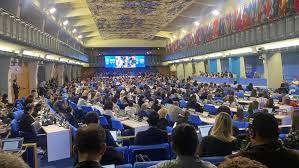COP16.2 concludes with landmark decisions on biodiversity financing and monitoring

Sourced from Forest Peoples Programme by Samuel Ogunsona
The Convention on Biological Diversity (CBD) concluded its 16th meeting (COP16.2) in Rome, Italy, with landmark decisions on biodiversity financing and monitoring.
The conference, which took place from February 25-27, finalized outstanding items from the previous meeting in Cali, Colombia, including new finance mechanisms and an updated monitoring framework.
A framework for resource mobilization was finalized, aiming to raise $200 billion annually by 2030, with $20 billion to be mobilized in 2025.
The framework includes contributions from various sources, such as the private sector, government budgets, and multilateral development banks.
Parties agreed on a roadmap to establish a permanent global financial mechanism for biodiversity, with the Global Environment Facility (GEF) serving as the interim mechanism.
The long-term solution will be discussed in the next few years.
The Cali Fund, a voluntary fund, was launched to support biodiversity conservation.
The fund will allocate 50% of its resources to Indigenous Peoples and Local Communities.
The Monitoring Framework for the Kunming-Montreal Global Biodiversity Framework (KMGBF) was adopted, providing a common framework for tracking progress toward the framework’s goals and targets.
The Planning, Monitoring, Reporting, and Review (PMRR) process was finalized, allowing for contributions from non-Parties and supporting the implementation of the KMGBF through a whole-society approach.
The outcomes of COP16.2 mark a significant step forward in addressing the global biodiversity crisis.
The conference’s success demonstrates the commitment of Parties to advance the implementation of the Global Biodiversity Framework.





